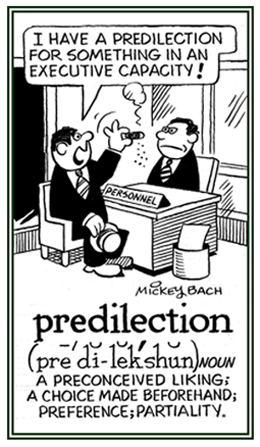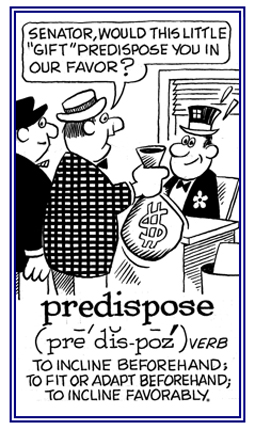predicate
(PRED i kit") (s) (noun), predicates
(pl)
1. That part of a sentence or clause that has a verb which says something about the subject or the object: An example of a predicate is "went home" in the sentence, "Jack and Jill went home".
2. Etymology: from Latin, praedicatum, "something declared" and praedicatus,"declared, proclaimed"; from the verb praedicare; from prae, "beforehand" + dicare, "to make known".
predicator
(s) (noun), predicators
(pl)
A word that is a constituent of a part of a sentence, together with the subject, object, and adjunct: In formal terms, a verb is the predicator, because its function is to state something about the noun that expresses the action or that which is explained by the verb.
predict
(verb), predicts; predicted; predicting
To foretell, to prophesy, or to announce an event, etc. before it happens: Unemployment data is
predicted to be higher following month.
Weather forecasters are said to be in the only profession that can predict events and be wrong so often and still stay in business.
predictable
(adjective), more predictable, most predictable
1. Concerning something which happens or turns out in the way that is anticipated or probable: With so much financial backing by special interests, the predictable results of the politician's election were expected.
2. Pertaining to a person or an animal that behaves in a way that is likely to be true: Nancy said she knew her father to be predictable and say that she couldn't go to the dance and stay out until midnight.
predictably
(adverb), more predictably, most predictably
Referring to how something is able to be anticipated or expected: The Senator made a predictably hostile interruption when the man started to criticize him about his political position.
prediction
(s) (noun), predictions
(pl)
1. The action of foretelling future events, also an instance of this; a prophecy: The gossipy ladies made a prediction that Susan, the orphan daughter of their friend, would marry within the year.
2. A statement that is made before something actually happens: The newspaper published a prediction that gold would be found on the remote island, and it proved to be true!
predictor
(s) (noun), predictors
(pl)
A person who, or that which, foretells or indicates that something is going to happen before it actually takes place: Quite often weather forecasters are accurate predictors.
predigest
(verb), predigests; predigested; predigesting
To treat food, normally by the way of a chemical or an enzymatic action, before consuming it: Spiders are known to predigest their victims first by inserting a protein into them, and then consuming them!
predigestion
(noun), predigestions
(pl)
The partial artificial absorption of food before swallowing it: Some canids, like wolves, are known to hunt and eat what they catch, and then, following the process of predigestion and returning to their dens, regurgitate what they have eaten and feed their pups.
predilection
(s) (noun), predilections
(pl)
1. A special liking or preference for something: Jim's son and daughter each had a
predilection for adventure stories.
2. A tendency to think favorably of something in particular; a partiality: Kate has a
predilection for rich desserts after each lunch and dinner.
3. Etymology: from Latin
praedilectus, prediligere, "to prefer before others"; from
prae-, "before" +
diligere, "to choose, to love"; also from French
predilection, "before others."
Based on diligent which came from dis-, "apart" + legere, "to choose".
 © ALL rights are reserved.
© ALL rights are reserved.
Go to this Word A Day Revisited Index
so you can see more of Mickey Bach's cartoons.
predispose
(verb), predisposes; predisposed; predisposing
1. To cause or to make someone develop a particular attitude: By reading to her children at a young age, Marie was hoping to
predispose them toward the love of books and reading.
If a litigant predisposes a judge, the judge has an inclination in that person's favor before the trial begins.
2. To be susceptible to an unhealthy condition or disease: Karla's medical history suggested that she was
predisposed to bronchial infections during the winter.
 © ALL rights are reserved.
© ALL rights are reserved.
Go to this Word A Day Revisited Index
so you can see more of Mickey Bach's cartoons.
predisposition
(s) (noun), predispositions
(pl)
A condition that suggests susceptibility or inclination towards something, such as a mood or a health issue: Randy had a
predisposition of developing a skin rash because of heat or overexposure to the sun as a child.
Based on Hope's childhood experiences, it would seem she has a predisposition to laughter and fun.
Brian had a latent predisposition to a disease which could be activated by stress.
predivination
(s) (noun), predivinations
(pl)
The foretelling or foreseeing of events beforehand; a prophecy: In the story Mary was reading, the main character was known for his predivinations of incidents and circumstances that were yet to come.
predivine
(verb), predivines; predivined; predivining
To portend beforehand; to presage; to prognosticate: Jack's grandmother predivined that his marriage would only last about a year before getting a divorce.
predominance
(s) (noun) (no pl)
1. Greater or greatest importance, power, or influence: There is a
predominance of English materials on the internet.
2. The state of being the most common or the greatest in number or amount: There was a
predominance of chickens on the farmer's property in comparison to the number of cows that he had.
Max was told that there was a predominance of older people at the present time than at any other period in history.
 © ALL rights are reserved.
© ALL rights are reserved.
Go to this Word A Day Revisited Index
so you can see more of Mickey Bach's cartoons.





